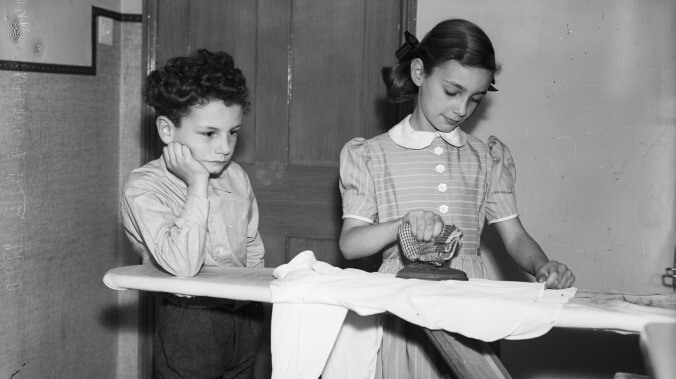When ironing gets hot: How one boring chore was taken to the extreme

This week’s entry: Extreme ironing
What it’s about: Just what it sounds like: pressing wrinkles out of clothes, but, you know, extreme! Fastidious thrill-seekers have been attempting to iron on tops of mountains, in midair, underwater, and in countless other unexpected locations, in the most potent blend of exciting and boring since baseball.
Biggest controversy: There’s a running, largely jokey debate on whether or not extreme ironing qualifies as a sport. But within that “sport,” there’s also a debate on who first took ironing to the extreme. Credit often goes to Phil “Steam” Shaw of Leicester, England, who came home from work one day in 1997, and finding he had too many chores to get done to go rock climbing, decided to combine the two activities. However, Yorkshire man Tony Hiam was extreme ironing as early as 1980, when struck by the absurdity of his brother-in-law bringing an iron and board on camping trips, began ironing on a mountain, in an airport, on top of phone booths, and the like.
Strangest fact: There’s already been an extreme ironing movie. In 2003, Channel 4 produced Extreme Ironing: Pressing For Victory, a documentary that chronicles Team Britain’s attempt to win the first Extreme Ironing World Championships, held outside Munich. Four other countries besides Britain and Germany competed, though Britain fielded three separate teams. Events included Urban, Water, Forest, Lauda (which involved a climbing wall), and Freestyle. Britain brought home the gold and bronze, which is what happens when you have three teams and other countries have one.
Thing we were happiest to learn: Britain can feel pride (or just as likely, shame) at dominating the field of extreme ironing even outside the World Championships. The dueling pioneers in the sport are both Brits, as are the team that ironed on Mt. Everest, the team that ironed on Mt. Rushmore, and the 128 divers who set a record by ironing together underwater. “Steam” Shaw also came out of retirement in 2012 to run the Hastings Half Marathon with an ironing board strapped to his back, smoothing wrinkles as he ran.
Thing we were unhappiest to learn: Americans are missing out on all the extremely mild fun. The only mentions of U.S. extreme ironing are a group of Key Largo divers attempting to break the aforementioned underwater record in 2010 near Christ Of The Abyss, and the oddly phrased statement “this has yet to popularize in North America.” The Key Largo divers’ record was broken a year later by a Dutch diving club, which set the record at 173 divers in an indoor swimming pool, which, frankly, doesn’t seem all that extreme by comparison.
Also noteworthy: In keeping with Britain’s fascination with things that are boring (see also cricket, cucumber sandwiches, and Coldplay), extreme ironing so entranced the nation that it was even referenced on EastEnders, the iconic prime-time soap opera. On a 2004 episode, a “party-loving” mother and daughter go to a bash where celebrities are rumored to appear, among them the Hot Plate Brothers, then the world record holders for highest-altitude ironing.
Best link to elsewhere on Wikipedia: For classical music buffs who like their concertos extreme, extreme ironing eventually inspired Extreme Cello. Unlike ironing, playing cello in unusual places hasn’t caught on beyond one small string ensemble calling themselves Extreme Cello, who have been touring cathedral rooftops, mountaintops, and giant Monopoly boards since 2003.
Further down the Wormhole: The 2009 underwater ironing record set in the U.K. took place in Chepstow, the town in Wales with the highest vowel-to-consonant ratio. As the holiday season bears down on us, we’ll travel to Wales next week for everyone’s favorite holiday tradition: having a rap battle with a skeletal horse, or in Welsh, Mari Lwyd.